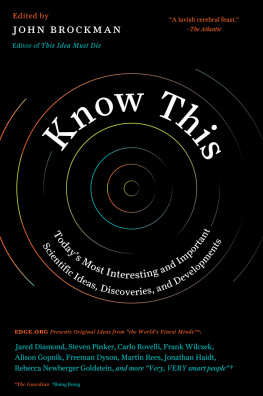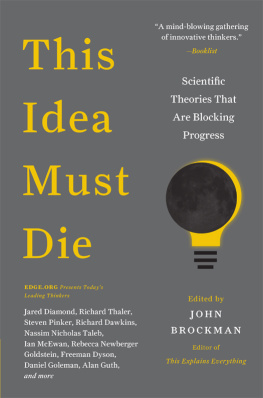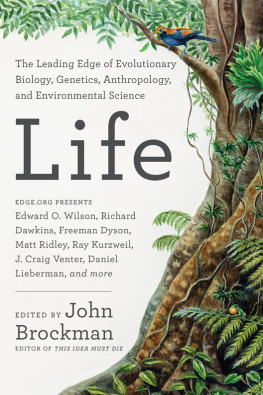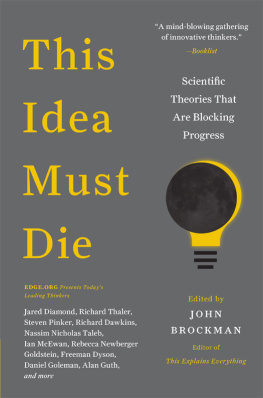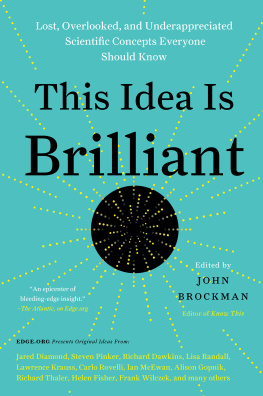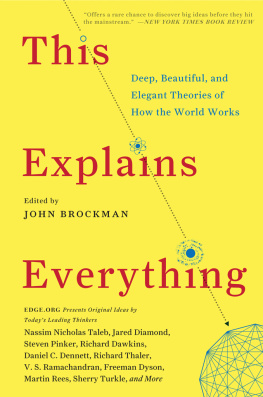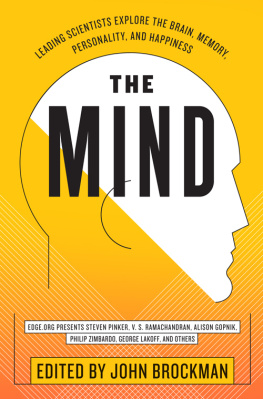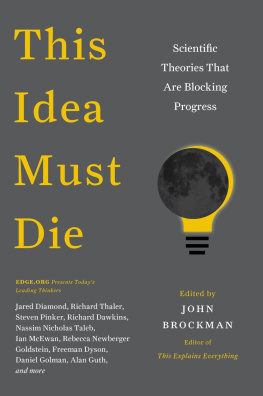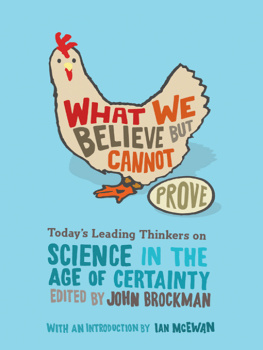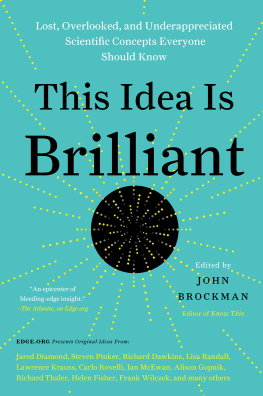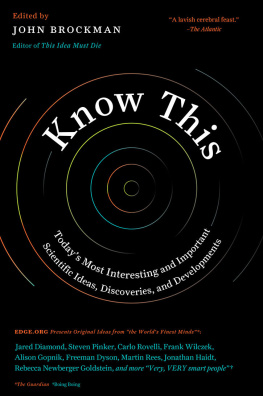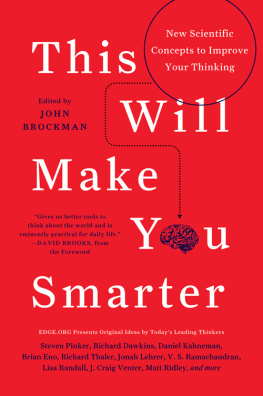Contents
For Juliet and Miles
Preface
The Edge Question
Scientific topics receiving prominent play in newspapers and magazines over the past several years include molecular biology, artificial intelligence, artificial life, chaos theory, massive parallelism, neural nets, the inflationary universe, fractals, complex adaptive systems, superstrings, biodiversity, nanotechnology, the human genome, expert systems, punctuated equilibrium, cellular automata, fuzzy logic, space biospheres, the Gaia hypothesis, virtual reality, cyberspace, and teraflop machines.... Unlike previous intellectual pursuits, the achievements of the third culture are not the marginal disputes of a quarrelsome mandarin class: they will affect the lives of everybody on the planet.
You might think that the above list of topics is a preamble for the Edge Question of 2016, but you would be wrong. It was a central point in my essay, The Third Culture, published twenty-five years ago in the Los Angeles Times, September 19, 1991. The essay, a manifesto, was a collaborative effort, with input from Stephen Jay Gould, Murray Gell-Mann, Richard Dawkins, Daniel C. Dennett, Jared Diamond, Stuart Kauffman, and Nicholas Humphrey among other distinguished scientists and thinkers. It proclaimed that the third culture consists of those scientists and other thinkers in the empirical world who, through their work and expository writing, are taking the place of the traditional intellectual in rendering visible the deeper meanings of our lives, redefining who and what we are, and it continued:
What traditionally has been called science has today become public culture. Stewart Brand writes that Science is the only news. When you scan through a newspaper or magazine, all the human interest stuff is the same old he-said-she-said, the politics and economics the same sorry cyclic dramas,... even the technology is predictable if you know the science. Human nature doesnt change much; science does, and the change accrues, altering the world irreversibly. We now live in a world in which the rate of change is the biggest change.
Science has thus become a big story, if not the big story: News that will stay news.
This is evident by the continued relevance today of the scientific topics in the 1991 essay, all of which were in play before the Web, social media, mobile communications, deep learning, Big Data. Time for an update....
WHAT DO YOU CONSIDER THE MOST INTERESTING RECENT [SCIENTIFIC] NEWS? WHAT MAKES IT IMPORTANT?
The online response this year is just shy of 200 contributions: Here is the news, sifted by those who often make it.
John Brockman
Publisher, Edge
Steven Pinker
Johnstone Family Professor, Department of Psychology; Harvard University; author, The Sense of Style
Human intuition is a notoriously poor guide to reality. A half-century of psychological research has shown that when people try to assess risks or predict the future, their heads are turned by stereotypes, memorable events, vivid scenarios, and moralistic narratives.
Fortunately, as the bugs in human cognition have become common knowledge, the workaroundobjective datahas become more prevalent, and in many spheres of life observers are replacing gut feelings with quantitative analysis. Sports have been revolutionized by Moneyball, policy by Nudge, punditry by 538.com, forecasting by tournaments and prediction markets, philanthropy by effective altruism, the healing arts by evidence-based medicine.
This is interesting news, and its scientific news because the diagnosis comes from cognitive science and the cure from data science. But the most interesting news is that the quantification of life has been extended to the biggest question of all: Have we made progress? Have the collective strivings of the human race against entropy and the nastier edges of evolution succeeded in improving the human condition?
Enlightenment thinkers thought this was possible, of course, and in Victorian times progress became a major theme of Anglo-American thought. But since then, Romantic and counterEnlightenment pessimism have taken over large swaths of intellectual life, stoked by historical disasters such as the World Wars and by post-1960s concerns with anthropogenic problems such as pollution and inequality. Today its common to read about faith in progress (often a nave faith), which is set against a nostalgia for a better past, an assessment of present decline, and a dread of the dystopia to come.
But the cognitive and data revolutions warn us not to base our assessment of anything on subjective impressions or cherry-picked incidents. As long as bad things havent vanished altogether, there will always be enough to fill the news, and people will intuit that the world is falling apart. The only way to circumvent this illusion is to plot the incidence of good and bad things over time. Most people agree that life is better than death, health better than disease, prosperity better than poverty, knowledge better than ignorance, peace better than war, safety better than violence, freedom better than coercion. That gives us a set of yardsticks by which we can measure whether progress has actually occurred.
The interesting news is that the answer is mostly yes. I had the first inkling of this answer when quantitative historians and political scientists responded to my answer to the 2007 Edge question (What Are You Optimistic About?) with data sets showing that the rate of homicides and war deaths had plummeted over time. Since then, I have learned that progress has been tracked by the other yardsticks. Economic historians and development scholars (including Gregory Clark, Angus Deaton, Charles Kenny, and Steven Radelet) have plotted the growth of prosperity in their data-rich books, and the case has been made even more vividly in Web sites with innovative graphics, such as Hans Roslings Gapminder, Max Rosers Our World in Data, and Marian Tupys HumanProgress.
Among the other upward swoops are these. People are living longer and healthier lives, not just in the developed world but globally. A dozen infectious and parasitic diseases are extinct or moribund. Vastly more children are going to school and learning to read. Extreme poverty has fallen worldwide from 85 to 10 percent. Despite local setbacks, the world is more democratic than ever. Women are better educated, marrying later, earning more, and in more positions of power and influence. Racial prejudice and hate crimes have decreased since data were first recorded. The world is even getting smarter: In every country, IQ has been increasing by three points a decade.
Of course, quantified progress consists of a set of empirical findings; it is not a sign of some mystical ascent or utopian trajectory or divine grace. And so we should expect to find some spheres of life that have remained the same, gotten worse, or are altogether unquantifiable (such as the endless number of apocalypses that may be conjured in the imagination). Greenhouse gases accumulate, fresh water diminishes, species go extinct, nuclear arsenals remain.
Yet even here, quantification can change our understanding. Eco-modernists such as Stewart Brand, Jesse Ausubel, and Ruth DeFries have shown that many indicators of environmental health have improved over the last half-century, and that there are long-term historical processessuch as the de-carbonization of energy, the dematerialization of consumption, and the minimization of farmlandthat can be further encouraged. Tabulators of nuclear weapons have pointed out that no such weapon has been used since Nagasaki, testing has fallen effectively to zero, proliferation has expanded the club only to nine countries (rather than thirty or more, as was predicted in the 1960s), seventeen countries have given up their programs, and the number of weapons (and hence the number of opportunities for thefts and accidents and the number of obstacles to the eventual goal of zero) has been reduced by five-sixths.

